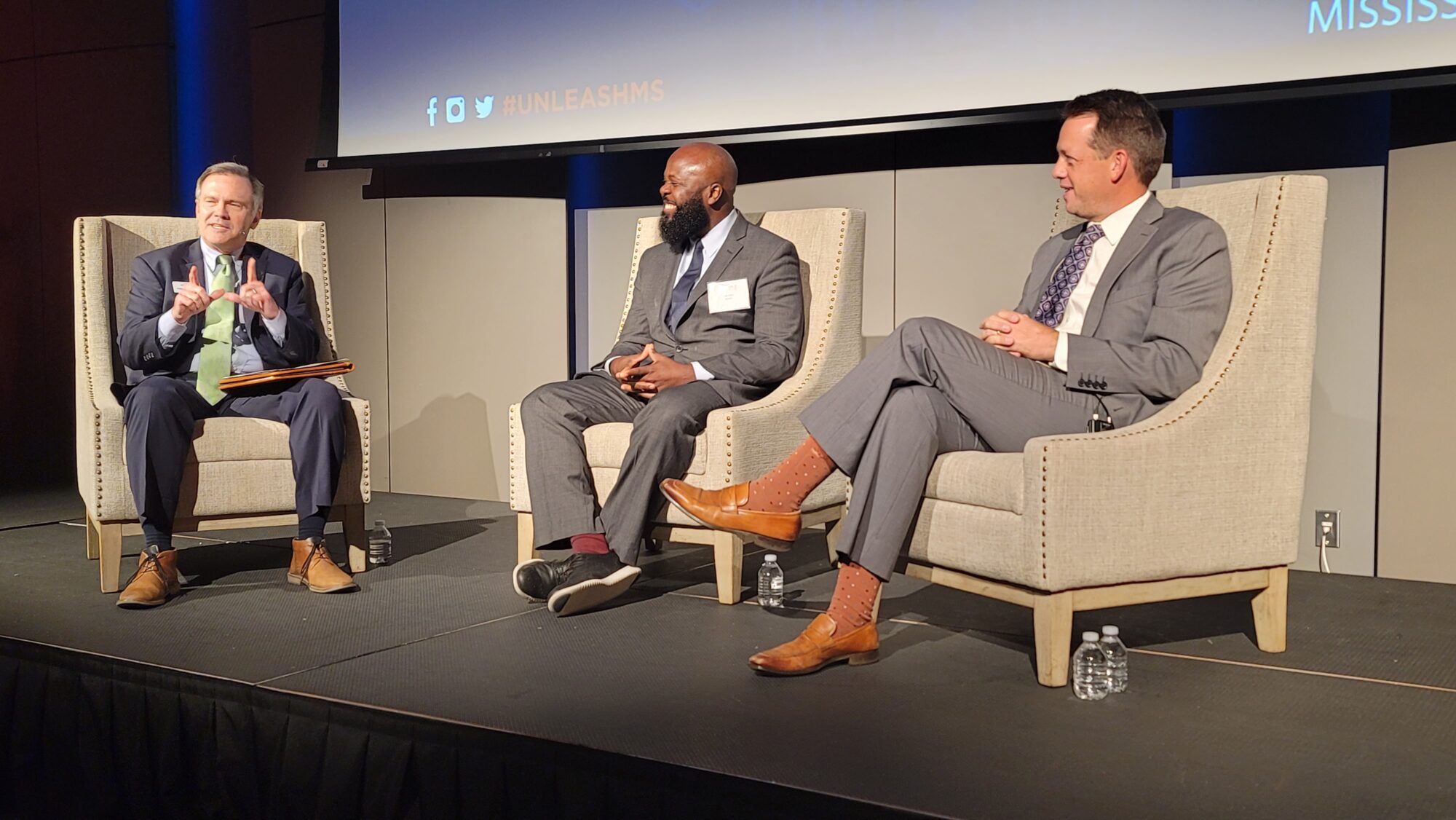
From left, Forest Thigpen with Empower Mississippi, Ja'Ron Smith with Public Safety Solutions for America and Bradley Lum with the Mississippi Department of Corrections talk about ways the justice system can be improved. That discussion was held last Thursday during Empower Mississippi's annual solution-centered policy summit called Unleash Mississippi. Photo by Jeremy Pittari
Job training, proportionate sentences and second chances could reduce crime, recidivism.
To be more effective, changes are needed in the current justice system. That was the message shared last week during Empower Mississippi’s solution-centered policy summit called Unleash Mississippi.
During the event, a panel discussion on the state of the justice system featured Ja’Ron Smith, a former policy adviser in the Trump White House and the head of Public Safety Solutions for America, a coalition aimed at reducing violent crime.
Smith was joined by Bradley Lum, Deputy Commissioner of Workforce Development for the Mississippi Department of Corrections, and Empower Mississippi Senior Adviser Forest Thigpen.
The trio spoke about methods to bring Mississippi’s incarceration rate down, while ensuring that the public is kept safe. Part of that conversation focused on programs that can be utilized to provide inmates with skills they can use to become productive post release.
The topic is of interest given that Mississippi has the highest incarceration rate in the nation, and America has the highest incarceration rate in the world, Thigpen said.
According to Prison Policy Initiative, the state has the highest prison population per capita, incarcerating 1,031 people per 100,000. That figure includes those held in the juvenile system, immigration detention, prisons and jails.
Recidivism, where those with previous convictions are sent back to prison for subsequent offenses, is also an issue.
Within three years of being released from jail, about 36.8 percent of Mississippians commit another crime that brings them back, according to World Population Review. That rate increases to about 77 percent after five years.
By employing some of the changes made on the federal level under the First Step Act, a bipartisan piece of legislation that was signed into law by former President Donald Trump, Smith said Mississippi’s recidivism rates can be reduced. The changes made in the First Step Act helped to reduce federal prison recidivism from roughly 40 percent to 12 percent. Smith also pointed to measures in the Act to ensure punishment was proportionate to the crime, including removal of the “three strikes” rule for non-violent offenses, providing judges more discretion through changes to so-called “mandatory minimum” sentences, and provisions that increased use of home confinement for individuals who do not represent a threat.
On the flip side, Smith pointed to times when policy changes increase crime. He used a recent change to a law in Washington D.C. as an example. He said that when the pursuit policy was changed to only allow a chase to occur in instances of violent crimes, car thefts went up about 300 percent.
Another example involved the city of San Francisco. Smith said that after a new law increased the threshold for a crime to be considered a felony from $500 worth of damages to $1,000, incidents of property damage increased.
To reduce instances of recidivism, Lum said inmates can be provided with a skill. In response, MDOC invested roughly $1 million in establishing a program to train people in prison to learn a trade such as plumbing, welding and construction. Forklift operators are also in high demand. Lum said MDOC could leverage that need and certify inmates so they have a job lined up before they are released.
“When the gates of a prison open, they should be better than when they went in,” Lum said.
With such a strong need for employees in the work force, Lum said there is a resource in employing those with a felony record. If employers provide former inmates a second chance and trust they will do their job, it results in that person’s success since they consider it may be their only chance to be gainfully employed.
MDOC has also partnered with private companies to provide incarcerated individuals with on-the-job training in the outside world. Participants receive the training they need to do a job while earning an income, such as working as a diesel technician. The inmates are also able to earn money, which is placed in a bank account to allow the person to pay any legal restitution or fees, while also saving for when they are released.
In the two years since the program has been offered, 52 individuals were able to earn a total of $800,000. However, Lum said the program is small right now, only capable of supporting 25 spots per year. He indicated the majority of those who go through the program accept a full-time job at the company that trained them, and not one participant so far has returned to jail.











